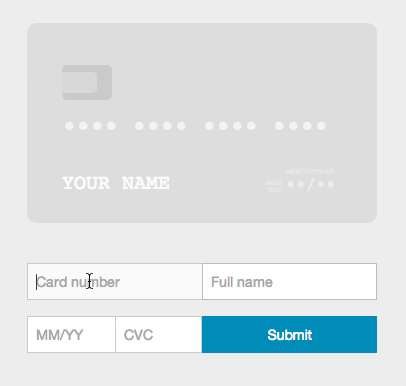Card - check out the demo
Card will take any credit card form and make it the best part of the checkout process (without you changing anything). Everything is created with pure CSS, HTML, and Javascript — no images required.
To use, you'll need to include the Card JavaScript files into your HTML. You can find the necessary file at /lib/js/card.js and include it in your HTML like so.
<!-- at the end of BODY -->
<script src="/path/to/card.js"></script>Once you've included those files, you can initialize Card.
var card = new Card({
// a selector or DOM element for the form where users will
// be entering their information
form: 'form', // *required*
// a selector or DOM element for the container
// where you want the card to appear
container: '.card-wrapper', // *required*
formSelectors: {
numberInput: 'input#number', // optional — default input[name="number"]
expiryInput: 'input#expiry', // optional — default input[name="expiry"]
cvcInput: 'input#cvc', // optional — default input[name="cvc"]
nameInput: 'input#name' // optional - defaults input[name="name"]
},
width: 200, // optional — default 350px
formatting: true, // optional - default true
// Strings for translation - optional
messages: {
validDate: 'valid\ndate', // optional - default 'valid\nthru'
monthYear: 'mm/yyyy', // optional - default 'month/year'
},
// Default values for rendered fields - optional
values: {
number: '•••• •••• •••• ••••',
name: 'Full Name',
expiry: '••/••',
cvc: '•••'
},
// if true, will log helpful messages for setting up Card
debug: false // optional - default false
});If you're using npm, you can install card.js with:
npm install --save card
var $ = require("jquery");
// The current card.js code does not explictly require jQuery, but instead uses the global, so this line is needed.
window.jQuery = $;
var card = require("card");
Card can be used in forms where you have multiple inputs that render to a single field (i.e. you have a first and last name input). To use Card with this functionality, just pass in a selector that selects the fields in the correct order. For example,
<script src="/path/to/card.js"></script>
<form>
<input type="text" name="number">
<input type="text" name="first-name"/>
<input type="text" name="last-name"/>
<input type="text" name="expiry"/>
<input type="text" name="cvc"/>
</form>
<script>
var card = new Card({
form: 'form',
container: '.card-wrapper',
formSelectors: {
nameInput: 'input[name="first-name"], input[name="last-name"]'
}
});
</script>Card renders with default values for card name, number, expiry, and cvc. To override these values, you can pass in a values object.
<script src="/path/to/card.js"></script>
<form>
<input type="text" name="number">
<input type="text" name="name"/>
<input type="text" name="expiry"/>
<input type="text" name="cvc"/>
</form>
<script>
var card = new Card({
form: 'form',
container: '.card-wrapper',
// passing in a messages object is another way to
// override the default card values
values: {
number: '**** **** **** ****',
name: 'Arya Stark',
expiry: '**/****',
cvc: '***'
}
});
</script>To render the card with the strings in a different language, you can pass in a messages object.
<script src="/path/to/card.js"></script>
<form>
<input type="text" name="number">
<input type="text" name="name"/>
<input type="text" name="expiry"/>
<input type="text" name="cvc"/>
</form>
<script>
var card = new Card({
form: 'form',
container: '.card-wrapper',
// passing in a messages object is another way to
// override the default field names
messages: {
validDate: 'expire\ndate',
monthYear: 'mm/yy'
}
});
</script>To use with jQuery, you'll need to include the jquery.card.js file into your HTML. You can find the necessary file at /lib/js/jquery.card.js and include it in your HTML like so.
<!-- at the end of BODY -->
<script src="/path/to/jquery.card.js"></script>Once you've included those files, you can initialize Card with jQuery.
$('form').card({
// a selector or DOM element for the container
// where you want the card to appear
container: '.card-wrapper', // *required*
// all of the other options from above
});
To contribute, follow this steps:
$ git clone --recursive https://github.com/jessepollak/card.git
$ cd card
$ git submodule init && git submodule update
$ npm install
$ npm startNow, if you go to localhost:8080/example in your browser, you should see the demo page.
Card is used in the wild in these places:
Are you using Card in production? If so, we'd love to link to you from this page. Open a PR or drop @jessepollak a line on Twitter and we'll add you right away!
If you'd like to donate to help support development of Card, send Bitcoin directly to 17NUKd3v7GWben18kGhmFafa4ZpWrXpQSC or through Coinbase here.
